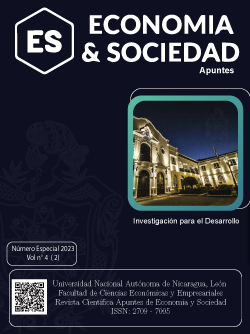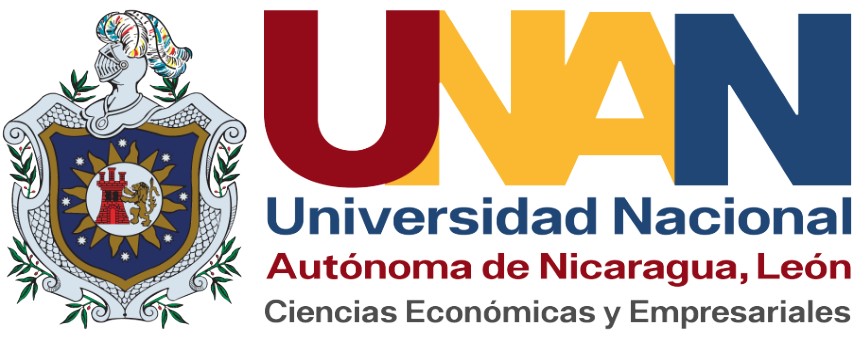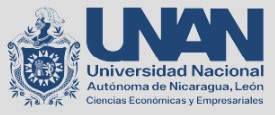Sustainable development, reduction of inequalities and education from a gender perspective
DOI:
https://doi.org/10.5377/aes.v4i2.16529Keywords:
education, gender, equality, sustainable development, leadershipAbstract
The present article studies the problem of gender inequality, and how the development of educational processes represents a key mechanism to transform the social dynamics that cause this phenomenon. This qualitative study was carried out in two phases. First, two focus groups were formed, one with women and one with men, with students of the third or fourth year of the Faculty of Law and Social Sciences of the Catholic University Redemptoris Mater, Nicaragua, to identify training needs in the community. In the second phase, specialists and facilitators who have taught courses on the subject were interviewed to gather good practices and experiences that would serve as a basis to suggest contents for the design of a postgraduate course. The results show a high level of acceptance of the people consulted. In addition, it is evident the importance of studying the historical aspects to lay the theoretical foundations on the subject, elements on gender violence and the different manifestations, and power relations in the current social context. Finally, it was necessary to include a unit focused on the Sustainable Development Goals as a global reference framework, as well as the topic of leadership to provide practical tools to potential participants of the course.
Downloads
References
Arias-Odón, F. (2006). Proyecto de Investigación: Introducción a la metodología científica (7ma Edición) Ediciones El Pasillo C.A. https://www.researchgate.net/publication/27298565_El_Proyecto_de_la_Investigacion_Introduccion_a_la_Metodologia_Cientifica
Asamblea General de la ONU (1948). Declaración Universal de los Derechos Humanos (A/RES/217[III]). Paris, Francia. https://www.ohchr.org/EN/UDHR/Documents/UDHR_Translations/spn.pdf
Asamblea General de la ONU (1993). Declaración sobre la Eliminación de la Violencia contra la Mujer (A/RES/48/104). https://undocs.org/es/A/RES/48/104
Ayuda en Acción (2019). Tipos de violencia contra las mujeres. Recuperado de https://ayudaenaccion.org/ong/blog/mujer/tipos-violencia-mujeres/
Brooks, A., Huang, L., Wood, S., & Murray, F. (2014) Investors prefer entrepreneurial ventures pitched by attractive men. Proceedings of the National Academy of Sciences. 111 (12) 4427-4431. https://doi.org/10.1073/pnas.1321202111
Cahn, N. (2020). Do Women And Men Have A Confidence Gap? Recuperado de: https://www.forbes.com/sites/naomicahn/2020/02/26/do-women-and-men-have-a-confidence-gap/?sh=1b77ebfc7bd2
Correll, S., & Simard, C. (2016) Research: Vague Feedback Is Holding Women Back. Harvard Business Review. Recuperado de: https://hbr.org/2016/04/research-vague-feedback-is-holding-women-back
Corbett, C., & Hill, C. (2012). Graduating to a Pay Gap The Earnings of Women and Men One Year after College Graduation. Rep. Washington, DC. Recuperado de: https://eric.ed.gov/?id=ED536572
De la Campa, E. S. y Coello Cremades, R. (2016). Guía para la transversalización de la perspectiva de género en los programas, iniciativas y proyectos adscritos de la cooperación iberoamericana. Secretaría General Iberoamericana. Recuperado de: https://www.segib.org/wp-content/uploads/GUIA-TPG-ESP-WEB.pdf
Foucault, M. (2002). Vigilar y Castigar Nacimiento de la prisión. Buenos Aires: Siglo XXI Editores Argentina S.A
Haynes, M., & Heilman, M. (2013). It had to be you (not me)! Women’s attributional rationalization of their contribution to successful joint work outcomes. Personality and Social Psychology Bulletin 39 (7). 956-969. Recuperado de https://nyuscholars.nyu.edu/en/publications/it-had-to-be-you-not-me-womens-attributional-rationalization-of-t
Hernández Sampieri, R., Fernández Collado, C., y Baptista Lucio, P. (2014). Metodología de la investigación (6a. ed. --.).
Institute of Leadership & Management (2011) Ambition and Gender at Work. Rep. London. Recuperado de: https://www.institutelm.com/static/uploaded/6151ed78-0ad1-495d-960e0ae40413b572.pdf
Katty, K., & Shipman, C. (2014). The confidence code: the science and art of self-assurance--what women should know. New York, NY: HarperBusiness, Harper Collins Publishers.
León Rodríguez, M. E. (2015). Breve historia de los conceptos de sexo y género. Rev. Filosofía Univ. Costa Rica, LlV (138). 39-47. https://hdl.handle.net/10669/75624
McKinsey&Company (2016). Women In the Workplace 2016. Recuperado de: https://www.mckinsey.com/~/media/McKinsey/Business%20Functions/Organization/Our%20Insights/Women%20in%20the%20Workplace%202016/Women-in-the-Workplace-2016.pdf
Naciones Unidas Derechos Humanos (2015). Manual de formación en derechos humanos y estrategias para la reducción de la pobreza. Capacitación Profesional N° 1. Recuperado de https://acnudh.org/wp-content/uploads/2019/06/038-Manual-de-formación-en-DERECHOS-HUMANOS-para-el-fortalecimiento-de-capacidades-técnicas.pdf
Olson, E. (2017). Study Finds Only Modest Gains by Women and Minorities on Fortune 500 Boards. The New York Times. Recuperado de www.iwecfoundation.org/news/study-finds-modest-gains-women-minorities-fortune-500-boards-us/
ONU Mujeres (05.02.2022). Preguntas frecuentes: Tipos de violencia contra las mujeres y las niñas. Recuperado de https://www.unwomen.org/es/what-we-do/ending-violence-against-women/faqs/types-of-violence
ONU MUJERES (01.02.2022) Hechos y cifras: poner fin a la violencia contra las mujeres. Recuperado de https://www.unwomen.org/es/what-we-do/ending-violence-against-women/facts-and-figures
Piura, J. (2012) Metodología de la Investigación científica: Un enfoque integrador (7ma. Edición).
Rico, M. N. (1996). Violencia de género: un problema de derechos humanos (LC/L.957). Comisión Económica para América Latina y el Caribe (CEPAL). Recuperado de: http://hdl.handle.net/11362/5855
Varela, N. (2019). Feminismo para principiantes. Recuperado de: https://planetafacil.plenainclusion.org/wp-content/uploads/2019/03/Feminismo-para-principiantes.-Lectura-f%C3%A1cil.pdf
Published
How to Cite
Issue
Section
License
Copyright (c) 2023 Universidad Nacional Autónoma de Nicaragua, León

This work is licensed under a Creative Commons Attribution-NonCommercial-ShareAlike 4.0 International License.














